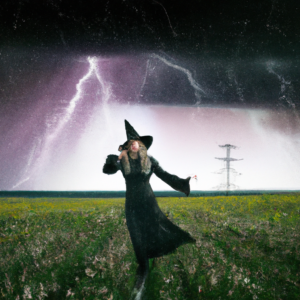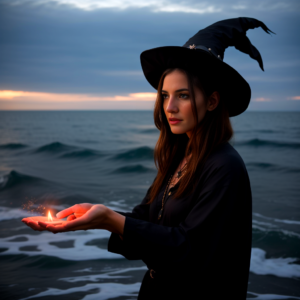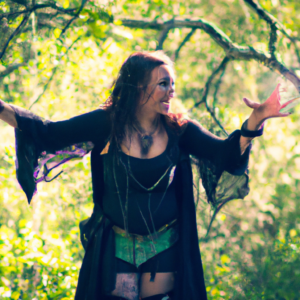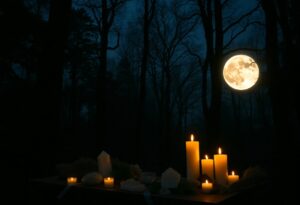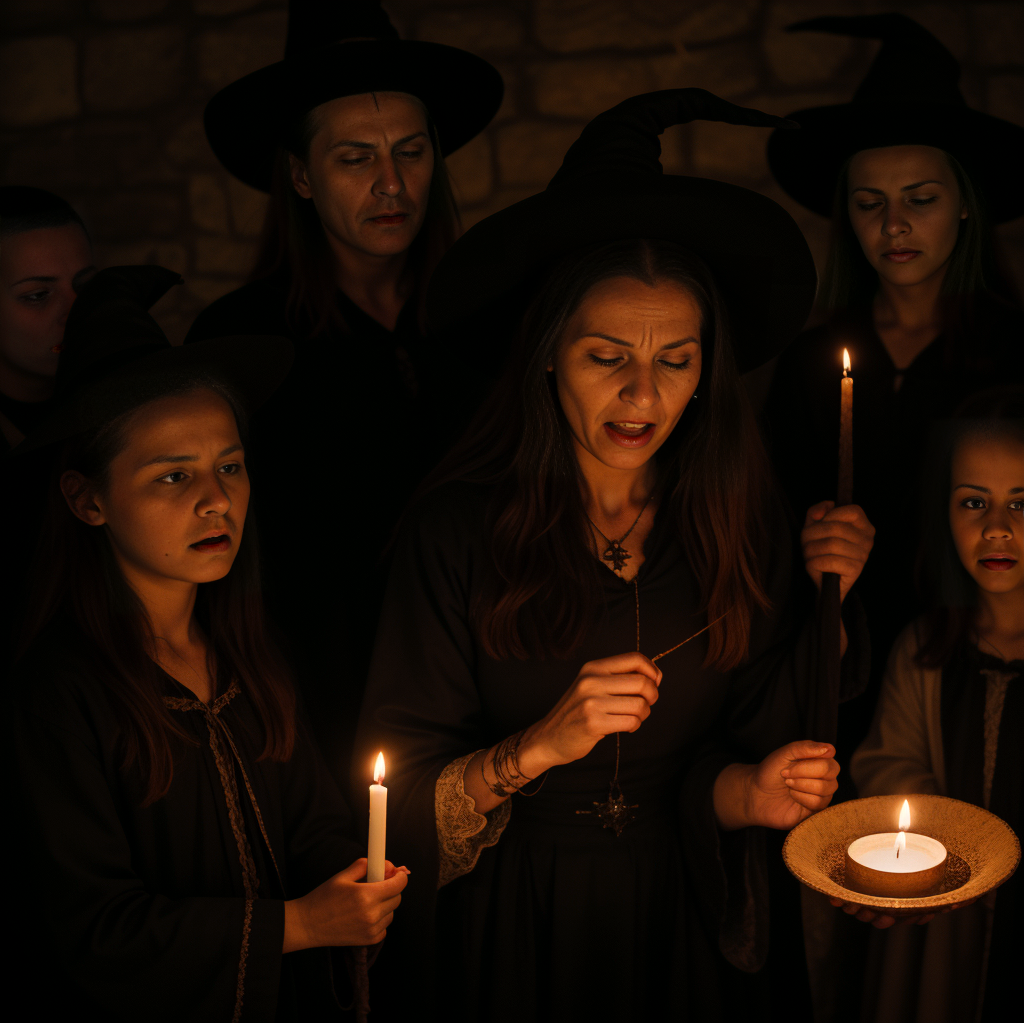
Witchcraft has long been associated with curses that have plagued families for generations. These real-life curses have left a lasting impact on those who have been affected, with stories that have been passed down through the ages. In this blog post, we will investigate into the origins of these curses and explore the chilling tales of families who have fallen victim to the dark forces of the supernatural.
Key Takeaways:
- Real-life curses have been known to affect families and individuals over generations, with harmful consequences that can include tragedies, misfortunes, and other negative experiences.
- These curses may originate from various sources, such as ancient rituals, witchcraft, or vendettas, and are believed to have supernatural or paranormal powers that bring about the intended harm or suffering.
- Families throughout history have reported experiencing curses that have had lasting impacts on their lives, leading to widespread belief in the existence and potency of such curses.
Historical Origins of Curses
Ancient Civilizations and Early Beliefs
Early civilizations across the globe believed in the power of curses as a means of invoking supernatural forces to bring harm to enemies or protect oneself. In ancient Mesopotamia, Sumerians inscribed curses on clay tablets, invoking the assistance of their deities to punish wrongdoers. Similarly, Egyptian pharaohs were known to curse tomb intruders to protect their resting places and treasures. The belief in curses transcended geographical boundaries and found expression in various forms in cultures such as the Greeks, Romans, and Chinese.
Medieval Europe and Witchcraft
The Middle Ages in Europe saw a resurgence of belief in curses, particularly through accusations of witchcraft. The fear of witches casting spells and curses on communities led to widespread witch hunts and trials, resulting in the persecution and execution of countless individuals. The Church played a significant role in perpetuating these beliefs, associating curses with demonic influence and the power of evil forces.
For instance, the infamous Salem Witch Trials in 1692 in Massachusetts, USA, stand as a stark reminder of the devastating impact of accusations of witchcraft and curses on society. The hysteria and paranoia surrounding alleged witches led to the execution of 20 people, highlighting the destructive consequences of belief in curses and supernatural powers.
Indigenous Cultures and Tribal Traditions
To indigenous cultures and tribal traditions, curses held a significant place in their belief systems and practices. Shamanic rituals and ceremonies often involved invoking curses for protection, healing, or retribution against enemies. In some African and Caribbean traditions, curses were seen as a means of harnessing the power of ancestral spirits to bring about desired outcomes or punish wrongdoers.
Civilizations throughout history have grappled with the concept of curses and their impact on individuals and communities. Whether rooted in ancient beliefs, medieval superstitions, or indigenous practices, the fear and power associated with curses continue to fascinate and haunt the human psyche, serving as a reminder of the enduring influence of the supernatural on human affairs.
Types of Curses
If you believe in the power of curses, you may be familiar with the different types that can affect individuals, families, and objects. Recognizing the signs of a curse and understanding its origin can be crucial in breaking its hold.
Personal Curses
Any individual can fall victim to a personal curse, which is typically placed by someone harboring negative feelings or intentions towards them. This type of curse can manifest as persistent bad luck, health issues, or relationship problems. Breaking a personal curse often requires spiritual intervention and protective measures to prevent further harm.
Family Curses
Personal curses can sometimes extend to affect an entire family, causing a series of unfortunate events or tragedies that seem to follow generations. Personal grudges, unresolved conflicts, or unresolved issues can contribute to the continuation of a family curse. The impact of a family curse can be devastating, affecting multiple members and creating a pattern of suffering and misfortune. The cycle of a family curse can be difficult to break, as it often involves deep-rooted issues and unresolved conflicts within the family dynamic. Seeking the help of a spiritual healer or conducting rituals to cleanse the family lineage may be necessary to rid the curse’s influence and bring peace to the family.
Object Curses
Personal belongings or objects can also become cursed, carrying negative energy or spirits that can affect their owners. Object curses can lead to accidents, financial problems, or emotional distress for those in possession of the cursed item. It is important to be cautious when acquiring or using antique or second-hand objects, as they may carry a curse from a previous owner. To break an object curse, it is vital to cleanse the object through rituals, prayers, or seeking the assistance of a spiritual practitioner. Removing the negative energy attached to the object can release its hold on the owner and prevent further harm. Proper care and respect for the object can help ward off future curses and ensure a sense of protection and well-being.
Famous Family Curses
The Kennedy Curse
Curses have long been a part of folklore and legend, but some families seem to be affected by real-life curses that have plagued generations. One such example is the Kennedy family, who have endured a series of tragic events that have led to the belief in a ‘Kennedy Curse’.
The curse is said to have originated with Joseph Kennedy Sr., the patriarch of the Kennedy family, who allegedly made a deal with a witch in exchange for his family’s success. However, this success came at a great cost, as several members of the Kennedy family have met untimely deaths or faced serious misfortunes.
The curse gained widespread attention after the assassinations of President John F. Kennedy and his brother Robert F. Kennedy, but it has also affected other family members, including John F. Kennedy Jr. and Joseph Kennedy Jr., who both died tragically in plane crashes.
The Habsburg Curse
Curses are not just confined to modern times; historical families also have their own tales of cursed lineage. The Habsburg family, one of Europe’s most powerful dynasties, is said to have been plagued by a curse that led to a series of genetic disorders and physical deformities.
A prominent feature of the Habsburg curse was the phenomenon known as ‘Habsburg jaw’, a genetic trait that resulted in mandibular prognathism and other facial abnormalities. The intermarriage within the Habsburg family over generations is believed to have perpetuated these genetic issues, earning them the label of being cursed.
Despite their wealth and power, the Habsburg family’s curse eventually had a significant impact on their dynasty, leading to their decline and eventual downfall. The curse serves as a cautionary tale about the consequences of inbreeding and the dangers that can result from it.
The Borden Family Curse
Curses can also strike ordinary families, as seen in the case of the Borden family, infamous for the brutal murders of Andrew and Abby Borden in 1892. The curse is believed to have originated from Lizzie Borden, the daughter suspected of the murders, who was acquitted but shunned by society.
The curse is said to bring misfortune and tragedy to anyone associated with the Borden family, with reports of financial ruin, mental illness, and untimely deaths befalling descendants and those connected to the family. The enduring legacy of the Borden family curse continues to intrigue and unsettle to this day.
Despite the passage of time, the shadow of these family curses serves as a reminder of the mysterious and unexplainable forces that can shape the fate of individuals and families. Whether rooted in folklore or historical events, these curses fascinate and intrigue, leaving us to ponder the unknown powers that may influence our lives.
Witch Curses That Were Real
The Salem Witch Trials
One of the most well-known cases of witches and curses in history, the Salem Witch Trials occurred in Massachusetts in 1692. More than 200 people were accused of practicing witchcraft, leading to the execution of 20 individuals. The hysteria surrounding the trials left a lasting impact on the community, with many families experiencing devastation as a result of the accusations and trials.
The fear of witchcraft and curses during this time was fueled by superstition, religious beliefs, and social tensions, ultimately leading to tragic consequences for those accused. The legacy of the Salem Witch Trials serves as a cautionary tale about the dangers of mass hysteria and the importance of due process in matters of justice.
The Pendle Witch Trials
The Pendle Witch Trials took place in Lancashire, England in 1612. A group of individuals known as the Pendle witches were accused of practicing witchcraft and causing harm to their community. The trials resulted in eleven individuals being found guilty and executed, reflecting the widespread fear and paranoia surrounding accusations of witchcraft during this time.
The Bell Witch Curse
The Bell Witch Curse is a legendary case of a supposed curse that plagued the Bell family in Tennessee in the early 19th century. The family reported experiencing unexplained phenomena, physical attacks, and disturbances attributed to a malevolent entity believed to be a witch. The curse has become a popular folklore tale, with many considering it to be a real instance of supernatural activity.
Modern Interpretations of Curses
Psychological Effects
To truly understand the impact of curses on families, one must investigate into the psychological effects they can have. Despite the lack of scientific evidence supporting the existence of curses, the fear and anxiety surrounding them can still have a profound effect on individuals. The belief in curses can lead to a self-fulfilling prophecy, where individuals may subconsciously sabotage their own success due to their belief in the curse’s power.
Additionally, the fear of a curse can create a sense of powerlessness and loss of control, leading to feelings of anxiety and stress. The psychological toll of living under the shadow of a curse can be significant, impacting relationships, mental health, and overall well-being.
Ultimately, the psychological effects of curses highlight the importance of understanding the power of belief and how it can influence our thoughts and behaviors, whether curses are real or not.
Cultural Influences and Media
Media plays a crucial role in shaping our perceptions of curses and their impact on families. From movies and TV shows portraying cursed families to sensationalized news stories, the media often perpetuates the idea that curses are real and have a devastating effect on those who are afflicted. The constant exposure to these narratives can reinforce belief in curses and perpetuate fear and superstition.
The influence of cultural beliefs and traditions cannot be underestimated in shaping our views on curses. In many cultures, curses are deeply ingrained in the collective consciousness and play a significant role in shaping societal norms and behaviors surrounding curses.
The Role of Skepticism
To counteract the fear and superstition surrounding curses, skepticism plays a crucial role in challenging traditional beliefs and promoting critical thinking. Cultural skepticism encourages individuals to question the validity of curses and seek evidence-based explanations for seemingly cursed occurrences.
For instance, skeptics may argue that seemingly cursed events can often be explained by logical and scientific means, rather than supernatural forces. By promoting skepticism and rational thought, individuals can empower themselves to overcome the fear of curses and take control of their own destinies.
Mechanisms of Curses
Verbal Incantations
Not all curses require elaborate rituals or sacrifices – some are cast simply through the power of words. Verbal incantations, spoken with intention and malice, can carry potent energy capable of inflicting harm on their target. In real life cases of curses, the spoken word has been known to wield a dangerous power, causing misfortune and suffering to those unlucky enough to be targeted.
Incantations whispered in dark corners or shouted in fits of rage can carry a weight that transcends mere words, tapping into the mystical forces believed to govern the universe. Whether uttered by a vengeful individual or a skilled practitioner of the dark arts, these verbal curses can linger in the air like a poisonous cloud, waiting to unleash their effects on the unsuspecting victim.
In curses, the spoken word can be a weapon more powerful than any physical harm. Those who have experienced the devastating effects of verbal incantations understand the chilling reality that curses can manifest from a simple utterance, leaving a trail of destruction in their wake.
Written Spells and Hexes
For generations, written spells and hexes have been used as potent tools for casting curses upon others. Whether inscribed on parchment, etched into candles, or carved into objects, these written incantations hold a formidable power that transcends the physical world. In real life cases of curses, the intricate symbols and cryptic words of a spell can unleash forces that wreak havoc on the lives of those targeted.
Ancient grimoires and spellbooks contain a wealth of knowledge on the art of crafting written spells, detailing the precise techniques and ingredients needed to imbue the curse with its full potency. From binding spells that trap the victim in a web of misfortune to hexes that bring about endless suffering, the written word has long been a favored tool of those seeking to wield dark magic against their enemies.
The act of writing a curse can imbue the words with a tangible energy, creating a physical manifestation of the malevolent intentions behind the spell. In the world of curses, the written word is a formidable force that can bind the victim in a web of suffering from which escape is nearly impossible.
Rituals and Sacrifices
An integral part of many curses, rituals and sacrifices serve to amplify the power of the curse and establish a deeper connection to the forces at play. Real life curses often involve intricate ceremonies and symbolic acts designed to appease or invoke supernatural entities believed to hold sway over the destinies of mortals. The blood of sacrificed animals, the burning of incense, and the chanting of ancient hymns are all common elements in the ritualistic casting of curses.
An understanding of the arcane rituals and sacrifices required for a curse is crucial for those seeking to wield the power of dark magic. The meticulous preparation and execution of these ceremonies are believed to elevate the curse to a higher plane of existence, allowing it to exert a greater influence on the lives of those cursed.
The elaborate nature of rituals and sacrifices serves to underscore the seriousness and permanence of curses in the eyes of those who practice the dark arts. For those unfortunate enough to be the target of such curses, the intricate ceremonies that accompany them only deepen the sense of dread and foreboding that hangs over their lives.
The Science Behind Curses
Placebo and Nocebo Effects
Nocebo effects occur when a person experiences negative outcomes simply because they believe they are cursed or hexed. In real life, individuals who strongly believe in curses may unknowingly manifest physical and psychological symptoms as a result of the power of suggestion. The mind’s ability to influence the body’s response through the nocebo effect is a fascinating aspect of curses.
Genetic Predispositions
Another intriguing factor in the manifestation of curses is genetic predispositions. Studies have shown that some families appear to be more susceptible to certain illnesses or misfortunes, which can be attributed to inherited genetic factors. This genetic susceptibility can create a cycle of unfortunate events that may be mistakenly perceived as a curse.
Further research into genetic predispositions and family histories could provide valuable insights into the concept of curses and their impact on families. Understanding the interplay between genetics and perceived curses could shed light on how these beliefs persist through generations.
Environmental Factors
Environmental factors also play a significant role in the perpetuation of curses within families. Living in an environment filled with negativity, stress, and trauma can exacerbate the belief in curses and contribute to a cycle of misfortune. This toxic environment can reinforce individuals’ belief in curses and perpetuate their negative effects.
- Family dynamics
- Socioeconomic status
This underscores the importance of addressing the environmental factors that contribute to the belief in curses and their impact on families. By creating a more positive and supportive environment, individuals may be able to break free from the cycle of curse-like misfortune.
With a better understanding of the placebo and nocebo effects, genetic predispositions, and environmental factors, it becomes clear that curses may have more to do with psychological and physiological processes than supernatural forces. By unraveling the science behind curses, we can work towards dispelling unfounded beliefs and empowering individuals to break free from the perceived curse that has plagued their families.
Cursed Objects and Places
The Hope Diamond Curse
Unlike urban legends or fictional tales, some curses are believed to have real-life consequences that have plagued individuals and families for generations. One such cursed object is the Hope Diamond, a stunning blue diamond that is said to bring misfortune to its owners.
The curse is said to have originated in India, where the diamond was believed to have been stolen from a statue of the Hindu goddess Sita. Since then, the diamond has passed through many hands, leaving a trail of tragedy and despair in its wake.
Owners of the Hope Diamond have reportedly suffered a variety of calamities, from financial ruin to untimely deaths. The curse continues to intrigue and mystify, as people speculate on the true power of this beautiful yet deadly gem.
The Mummy’s Curse
On the topic of cursed objects, one cannot overlook the infamous “Mummy’s Curse” that is said to have plagued those who disturbed the resting places of ancient Egyptian pharaohs. Numerous archaeologists and explorers who have uncovered mummies and tombs have been plagued by misfortune and tragedy.
Stories of mysterious deaths, accidents, and unexplained occurrences have been linked to the curse of the mummies, leading some to believe in the supernatural powers of the ancient Egyptian spirits. The fascination with this curse continues to capture the public imagination, adding a chilling aura to the world of archaeology.
To this day, the mystery surrounding the mummy’s curse remains unsolved, leaving a lingering sense of caution and respect for the ancient traditions and beliefs of Egypt.
The Winchester Mystery House
To research into cursed places, one cannot ignore the Winchester Mystery House, a sprawling mansion in California that is said to be haunted by the spirits of those killed by the Winchester rifle. The eccentric owner, Sarah Winchester, believed that she was cursed by the ghosts of those who fell victim to her family’s firearms.
Legend has it that Sarah Winchester built the maze-like house in a desperate attempt to appease the spirits, constructing staircases that lead nowhere and rooms with no purpose. Visitors to the house report eerie sightings and unexplained phenomena, adding fuel to the belief that the Winchester Mystery House is cursed.
Winchester’s obsession with continuously building and renovating the house until her death only adds to the mystery and intrigue surrounding the cursed mansion, making it a popular destination for those fascinated by the supernatural.
Curses in Literature and Pop Culture
Classic Literature
Many classic works of literature have examined into the theme of curses, showcasing the devastating effects they can have on families and individuals. An example is the curse described in Shakespeare’s tragedy, “Macbeth,” where the title character and his wife suffer the consequences of their actions after seeking power through dark means. The curse placed upon them leads to a series of tragic events, ultimately leading to their downfall.
In Greek mythology, the House of Atreus is infamous for its curse stemming from a dark deed committed by Tantalus. This curse follows generations of the Atreides family and leads to a cycle of violence, betrayal, and tragedy. The curse casts a shadow over the family, affecting their lives and relationships in profound ways.
From the ancient myths to Shakespearean dramas, curses in classic literature serve as cautionary tales about the repercussions of greed, ambition, and betrayal. These stories continue to captivate readers with their exploration of the supernatural and the human psyche.
Modern Cinema and Television
Literature is not the only medium that explores the concept of curses. Modern cinema and television have also embraced this theme, bringing it to life in captivating ways. From the curse of the Black Pearl in the “Pirates of the Caribbean” franchise to the curse of the werewolf in “The Wolfman,” curses continue to captivate audiences with their mysterious and compelling nature.
Modern filmmakers and show creators draw inspiration from various sources, including folklore, mythology, and urban legends, to create compelling narratives around curses. These stories often explore the psychological impact of curses on individuals and their relationships, adding depth and complexity to the characters and plot.
Curses in modern cinema and television offer a blend of suspense, horror, and drama, captivating audiences with their supernatural elements and intriguing storylines. Whether presented as a central plot point or a subtle background element, curses continue to fascinate viewers across different genres and mediums.
Folklore and Urban Legends
Modern folklore and urban legends are replete with tales of curses that have plagued families and communities for generations. These stories often revolve around haunted locations, cursed objects, or vengeful spirits seeking retribution. The chilling accounts of cursed individuals and families serve as cautionary tales, warning against tempting fate or disrespecting the supernatural.
Urban legends frequently feature cursed objects or places that bring misfortune to those who encounter them. From cursed dolls to haunted houses, these stories tap into our primal fears and superstitions, captivating audiences with their mysterious and eerie nature. The enduring popularity of such tales highlights our enduring fascination with the unknown and the supernatural.
Legal and Ethical Considerations
Fraud and Deception Cases
One of the most troubling aspects of real-life curses is the potential for fraud and deception. There have been numerous cases where individuals have claimed to be able to remove curses for a fee, only to leave families in financial ruin. In some instances, these so-called curse removers have been prosecuted for fraud, highlighting the importance of due diligence and skepticism when dealing with such claims.
It is vital to remember that fraudulent curse removal services not only exploit vulnerable individuals but also cast a shadow on legitimate practitioners of spiritual healing and psychic services. By being aware of red flags like exorbitant fees and promises of quick fixes, families can protect themselves from falling victim to these scams.
In cases of fraud and deception related to curses, it is crucial for legal authorities to investigate and prosecute individuals who prey on the fears and vulnerabilities of others. By holding these fraudsters accountable, we can help prevent future instances of exploitation in curses and supernatural phenomena.
Psychological Harm and Accountability
Ethical considerations come into play when exploring the psychological harm that real life curses can inflict on families. The fear and anxiety stemming from a perceived curse can have lasting effects on mental health and well-being. It is incumbent upon practitioners in the spiritual and psychic fields to approach their work with empathy and ethical integrity.
It is vital for practitioners to recognize the impact of their words and actions on the mental and emotional well-being of those seeking their services. Providing genuine support and guidance, rather than instilling fear and uncertainty, is crucial in mitigating the potential psychological harm associated with curses and supernatural beliefs.
Religious Freedom and Witchcraft Laws
With the resurgence of interest in witchcraft and occult practices, questions surrounding religious freedom and witchcraft laws have come to the forefront. In some jurisdictions, the practice of witchcraft is protected under laws safeguarding religious freedoms. However, the line between religious expression and fraudulent behavior can sometimes be blurred.
Legal frameworks that govern the practice of witchcraft vary widely around the world, with some countries imposing strict regulations and prohibitions on certain practices. It is important for individuals and families to be aware of the legal implications of engaging with practitioners of witchcraft and other spiritual traditions, ensuring that their rights and interests are protected.
With the growing interest in alternative spiritual practices, policymakers and legal authorities are faced with the challenge of striking a balance between upholding religious freedoms and protecting the public from potential harm and exploitation. By examining existing laws and regulations related to witchcraft, societies can navigate the complex landscape of supernatural beliefs and practices while ensuring ethical and legal accountability.
Cross-Cultural Perspectives on Curses
African Perspectives
Perspectives on curses in African cultures are deeply rooted in traditional beliefs and ancestral customs. Curses are often seen as a form of spiritual retribution for wrongdoing or a means of protecting the community from harm. Curses can be passed down through generations, impacting entire families and communities. They are believed to have the power to cause illness, misfortune, and even death.
In many African societies, curses are taken very seriously, with rituals and ceremonies conducted to remove or neutralize the effects of a curse. There are often specific healers or spiritual practitioners who specialize in dealing with curses and hexes. These individuals are highly respected within their communities and play a vital role in maintaining balance and harmony.
Some curses in African folklore are said to be so powerful that they can only be lifted through elaborate ceremonies or sacrifices. The belief in curses reflects a deep-seated spiritual worldview that acknowledges the interconnectedness of individuals, families, and the spirits of the natural world.
Asian Beliefs
On the other hand, Asian cultures have their own unique perspectives on curses and hexes. In many Asian societies, curses are often associated with supernatural forces and malevolent spirits. Curses can be placed on individuals as a form of punishment or revenge, often stemming from unresolved conflicts or grievances.
With a rich history of folklore and mythology, Asian beliefs in curses are intertwined with concepts of karma, fate, and spiritual balance. The idea that negative actions can lead to the accumulation of bad karma, resulting in curses or misfortune, is prevalent in many Asian traditions. Spiritual practices such as meditation, prayer, and offerings are often used to counteract the effects of curses.
While curses in Asian cultures may vary in their specific forms and rituals, the underlying belief in the power of spiritual forces and the interconnectedness of the human and supernatural realms remains a common thread across different countries and traditions.
Latin American Traditions
Curses hold a significant place in Latin American folklore and traditions, with roots in indigenous beliefs and Catholicism. Curses are often seen as a form of divine punishment or spiritual consequence for committing sins or betraying societal norms. They are believed to have the power to afflict individuals with illness, bad luck, or even possession by malevolent spirits.
Curses are often intertwined with practices such as witchcraft, sorcery, and folk magic in Latin American cultures. There are often specialized healers known as curanderos or brujos who are consulted to remove curses or provide protection against malevolent forces. These individuals possess knowledge of herbal remedies, sacred rituals, and spiritual practices to counteract the effects of curses.
While the specific rituals and beliefs surrounding curses may vary from country to country in Latin America, the underlying fear and respect for the power of curses remain deeply ingrained in the cultural fabric of the region.
Cross-Cultural Perspectives on Curses
Breaking Curses
Traditional Remedies and Rituals
The ancient practice of breaking curses often involves a combination of traditional remedies and rituals. These remedies may include the use of herbs, crystals, and other natural elements believed to have protective and cleansing properties. Rituals such as prayers, chants, and ceremonies are performed to break the curse and return harmony to the affected individuals.
In some cultures, shamans or spiritual healers are called upon to perform specific rituals to rid the family of the curse. These rituals can be intense and elaborate, requiring the participation of the entire family to break the curse and restore balance to their lives.
One common traditional belief is that the power of a curse can be nullified by the person who has been cursed. By developing a strong sense of inner strength, resilience, and positivity, individuals can overcome the negative effects of the curse and reclaim their lives.
Modern Psychological Approaches
To complement traditional remedies, modern psychological approaches can also be effective in breaking curses. Psychologists and therapists work with individuals to address underlying issues that may be contributing to the curse’s impact on their lives. By exploring beliefs, emotions, and behaviors, individuals can gain insight into how the curse is affecting them and develop strategies to overcome its influence.
For instance, cognitive-behavioral therapy can help individuals challenge and change negative thought patterns that may be reinforcing the curse’s power. Mindfulness techniques and stress management strategies can also help individuals build resilience and cope with the effects of the curse on their mental and emotional well-being.
Religious and Spiritual Interventions
The power of faith and spirituality can also play a significant role in breaking curses. Many religious traditions offer rituals, prayers, and blessings that are believed to protect individuals from curses and negative energies. Seeking guidance from a religious leader or spiritual advisor can provide individuals with support and guidance in breaking the curse.
Traditional practices such as lighting candles, creating protective amulets, and performing purification rituals are common in religious and spiritual interventions to break curses. These practices are believed to strengthen the individual’s spiritual connection and protect them from the harmful effects of the curse.
Testimonials of Cursed Individuals
First-Hand Accounts
To truly understand the impact of curses on families, we must probe into the first-hand accounts of those who have experienced them. Anecdotal evidence suggests that these curses can cause a myriad of misfortunes, from financial ruin to health issues and even tragic accidents. Some individuals claim that these curses have been passed down through generations, affecting multiple family members over time.
One such individual, who wishes to remain anonymous, recalls a series of inexplicable events that befell their family after a supposed curse was placed on their ancestors. They recount a string of tragedies that seemed to follow their bloodline, leading them to believe that they were indeed cursed. These testimonials serve as a chilling reminder of the very real impact of curses on families.
Despite the skepticism surrounding curses, these first-hand accounts paint a harrowing picture of the lasting effects they can have on individuals and their families. The psychological toll of living under the shadow of a curse cannot be underestimated, as these testimonies demonstrate the profound impact that belief in a curse can have on one’s life.
Investigative Reports
Accounts of cursed families have also captured the attention of investigative journalists and researchers, who seek to unravel the mysteries behind these supposed curses. Through in-depth analysis and interviews with those affected, these reports shed light on the real-life consequences of curses on families. Investigations have revealed patterns of misfortune and tragedy that seem to defy logical explanation, leaving many questioning the existence of curses.
Understanding the origins of these curses is crucial in unraveling their effects on families. Investigations often probe into the historical context of the curses, tracing them back to their roots in folklore and superstition. By piecing together the puzzle of these curses, researchers aim to offer insights into how they continue to impact families in the modern world.
Public Perceptions and Media Narratives
On a broader scale, public perceptions of curses and their effects on families are often shaped by media narratives and popular culture. The portrayal of curses in movies, books, and TV shows can fuel superstitions and fears surrounding these phenomena, perpetuating the belief in their power to bring misfortune. Despite the lack of scientific evidence, the allure of curses continues to captivate the public imagination.
To better understand the societal impact of these curses, it is vital to consider how they are depicted in the media. Media narratives often sensationalize curses, portraying them as malevolent forces that wreak havoc on unsuspecting families. By analyzing these narratives, we can gain insights into the broader cultural fascination with curses and their enduring presence in our collective consciousness.
Philosophical and Ethical Implications
The Morality of Cursing
All curses, whether real or perceived, raise important ethical questions about the morality of wishing harm upon others. The notion of cursing someone or their family highlights the darker aspects of human nature and the capacity for cruelty. It forces us to confront the consequences of our words and actions, as curses can have lasting effects on individuals and families for generations.
Furthermore, the power dynamics involved in cursing bring up questions about justice and fairness. Is it ever justified to use supernatural means to enact revenge or punishment? These are complex ethical dilemmas that challenge our understanding of morality and the boundary between right and wrong.
While some may argue that curses are mere superstition, the psychological and emotional impact they can have on individuals cannot be dismissed. The ethical implications of cursing go beyond the physical realm and probe into the realms of spirituality and morality.
Ethical Concerns in Witchcraft Practices
For centuries, witchcraft practices have been surrounded by ethical concerns, especially when it comes to the use of curses. The idea of harnessing supernatural forces to bring harm to others raises questions about the boundaries of personal freedom and responsibility. It also raises concerns about the potential misuse of power and the impact it can have on individuals and communities.
This age-old debate highlights the ethical complexities of witchcraft practices and the need for practitioners to consider the moral implications of their actions. The line between benevolent and malevolent magic is often blurred, leading to ethical dilemmas that challenge the very core of witchcraft beliefs and practices. It is important for practitioners to navigate these ethical concerns with caution and mindfulness.
Karma and Destiny Beliefs
To further complicate matters, the concept of karma and destiny plays a significant role in the philosophical and ethical implications of curses. The belief that actions have consequences, whether in this life or the next, adds a layer of complexity to the morality of cursing. It raises questions about the interconnectedness of all beings and the accountability we have for our thoughts and actions.
Practices rooted in karma and destiny beliefs emphasize the importance of mindfulness and intention in all actions, including the casting of curses. The idea that what goes around comes around reinforces the ethical view that harming others will ultimately lead back to the self. In this way, karma and destiny beliefs serve as a moral compass for navigating the complexities of cursing and its implications on individuals and families.
FAQ
Q: What are real-life curses that have affected families?
A: Real-life curses that have affected families are often stories passed down through generations, involving unexplained tragedies, misfortune, and seemingly supernatural occurrences that continue to plague the descendants of those affected.
Q: What is the origin of these curses?
A: The origin of these curses can vary, with some believed to be the result of ancestral wrongdoings or unresolved conflicts, while others may be attributed to the supernatural or paranormal influences. These curses are often steeped in local folklore, superstitions, and historical events.
Q: Are witch curses real?
A: The belief in witch curses, or hexes, has been prevalent in many cultures throughout history. While the existence of such curses cannot be scientifically proven, there have been documented cases of individuals claiming to have been cursed by witches, leading to personal and familial distress. Whether these curses are truly supernatural or psychological in nature remains a subject of debate.

